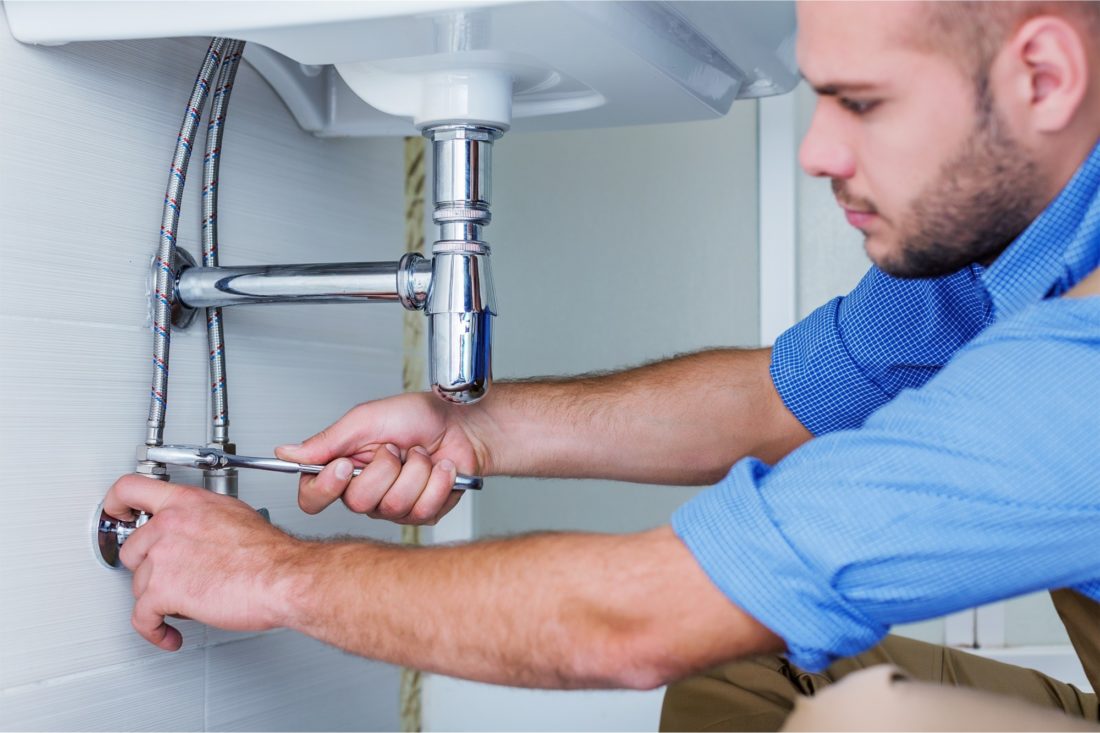 The next time you run water in a sink or take a bath, listen to the sound of water swishing down the drain. It’s a sweet sound and lets you know all is well in the drainpipe. What’s not so delightful is the sound of a gurgling drain.
The next time you run water in a sink or take a bath, listen to the sound of water swishing down the drain. It’s a sweet sound and lets you know all is well in the drainpipe. What’s not so delightful is the sound of a gurgling drain.
Hearing noisy drainpipes should make your ears perk up because gurgling isn’t exactly normal. While it could indicate a minor issue, it could also be your drain’s way of warning you about a deeper plumbing problem.
Don’t worry about the occasional bubble—it’s likely air in the water. Today’s post addresses the persistent gurgling sink or tub drain.
Take a minute and learn what the noise is all about and what you can do to stop it.
Table of Contents
Check for a Drain Clog
The cause of the noise may be an issue with the plumbing vents, but you should check for a drain clog first. A residential drain system works by gravity. Wastewater flows downhill through the drainpipes.
Gurgling in a drain sometimes means there’s a clog deep down the drain line. Unless enough water builds up and sends the clog out of the drain, it sits there and releases pockets of air into the water above.
The problem with a deep drain clog is reach. You can’t get to it with a drain snake, and it usually won’t budge if you use a plunger.
You probably won’t be able to affect this clog with a plunger or reach it with a store-bought drain snake, so let a plumber take care of it. For a clog of this magnitude, you’ll need to call a professional who offers plumbing services.
What Is Going on in the P Trap?
If you only hear gurgling in the bathtub or shower drain, you could have a problem in the P-trap.
Every tub and shower should have a P-trap installed underneath. A damaged trap can cause noise in the drain, but it’s isolated to the tub or shower. You’ll hear nothing unusual from the sink or toilet.
Before you diagnose the problem, you should call a plumber. You may have a clogged drain rather than a damaged or missing P-trap.
Next, we’ll explore what it means if you hear gurgling coming from more than one of your plumbing fixtures.
Ruling Out Blocked Drain Vents
Another critical component of your system is the plumbing vents. Every drain connects to a vent that opens on top of your house. Plumbing vents prevent sewer gas from building up inside the pipes and the sewer line.
Since they’re open at the top, vents can get clogged with bird nests, leaves, or other debris. If the sewer gas can’t escape through the vent, it finds an alternate escape route. Usually, the gas ends up trying to move through the water in the P-trap.
If you suspect a blocked drain vent, don’t venture up on the roof and try to clear it. It’s a job for a qualified plumber.
Do You Have Adequate Vents?
There’s a possibility you don’t have a blockage in the drain vents. Sometimes a plumbing vent system isn’t adequate.
If you’re living in a brand-new home and you’ve heard gurgling drains from the day you moved in, call a plumber. They’ll determine whether the vents are adequate for your home and the existing plumbing
Poorly vented drain lines can’t move wastewater and solid waste out of your home.
Gurgling Drains and Sewer Line Blockage
Dealing with a single noisy drain isn’t nearly as much of a challenge as figuring out what to do when every drain in your home gurgles.
When all the drains make noise at the same time, you may have a severe issue in the sewer line. Your sewer line connects your home to your city’s main sewer pipe. If you have a sewer line blockage, sewer gas can back up and move through the P-trap.
You’ll not only hear gurgling pipes you’ll smell a foul odor. If you ignore the sounds and the smell long enough, you run the risk of a sewage backup in your home. Sewage backups and sewer gas both create health hazards.
If you have a sewer line clog, your plumber will need to scour it out with a hydro jet.
One type of clog won’t move quickly through the system. If you have tree roots infiltrating your sewer line, you’ll need more than a shot of water from a hydro jet. When tree roots invade your sewer line, it usually requires digging up the old line and replacing it.
A Break in the Sewer Line
In the worst-case scenario, the sound of drains gurgling could indicate a broken sewer line.
Sewer line breaks often happen in homes built before 1970. Homes constructed before then may still have the old galvanized steel or iron sewer line. Some older homes even have clay sewer lines.
All of these materials tend to deteriorate, and when they do, they can develop leaks or breaks.
While the gurgling may sound innocent enough, if your plumber discovers a break in the sewer line, it’s a significant problem. While your plumber can often repair copper pipes, steel, iron, and clay aren’t usually salvageable.
Most plumbers will recommend a complete pipe replacement when the break occurs in a pipe made from these old materials. Today, plumbers can also use trenchless sewer line replacement, which doesn’t require digging.
Did You Enjoy Reading this Post?
Whether you end up with a simple drain clog, or you need more extensive plumbing work, we hope today’s post helped you troubleshoot the gurgling drains in your home.
If you enjoyed reading, check out the archives on our blog. You’ll find articles on a variety of topics designed to make homeownership and home improvement more fun.







